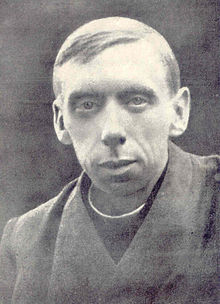George Tyrrell
George Tyrrell S.J. (Born February 6, 1861 in Dublin , Ireland ; † July 15, 1909 in Storrington , Sussex ) was a Roman Catholic priest and theologian. He is considered one of the key figures of modernism .
biography
In 1879 Tyrrell converted from the Anglican to the Roman Catholic Church and joined the Jesuits in 1880 . In 1891 he was ordained a priest. Because of his teachings, he was excluded in 1906 by the Jesuits, and on 22 October 1907 because of his public criticism of the encyclical Pascendi , Pope Pius X excommunicated . He was in contact with the stray Bishop Arnold Mathew and turned to the Christian Catholic Bishop Eduard Herzog in Bern: I need not say that I am a Modernist, ie that I believe that Catholicism can and must assimilate all that is best in the scientific and democratic tendencies of the age and justified the reasons why he cannot simply convert away from Rome. On his deathbed in 1909 he received conditionally the sacraments of the death, but was refused an ecclesiastical funeral by Bishop Peter Amigo of Southwark in consultation with Cardinal Secretary of State Rafael Merry del Val , Tyrrell's main opponent at the Roman Curia, because he had not made a formal revocation. His friend Henri Bremond , who assisted at the funeral without liturgical clothing, was temporarily suspended from his priesthood.
Tyrrell was originally shaped by neo-scholasticism . Their questionability became clear to him during his work as a spiritual guide and elite chaplain in the London Jesuit establishment on Farm Street. Influenced by reading John Henry Newman and dealing with the more recent German historical-critical exegesis brought to him by the "lay bishop of the modernists" Friedrich von Hügel , Tyrrell now placed the religious experience of the individual believers at the center of his theology. In view of the painful dissolution of the traditional ideas of the history of Revelation, which he himself painfully experienced, Tyrrell emphasized the secondary character of dogmatic determinations in the neo-Scholastic style: for him, the saints were the real experts on faith. The theologians' norms of belief could be useful, but they harbored the danger of absolutization. For Tyrrell, the presence of God in the faithful also had consequences for the understanding of the church : If God was not a transcendent absentee who had his message transmitted through the church hierarchy, as it were, then this would also have to change the role of the laity in the church . For Tyrrell, however, the church was still more than the sum of the individual believers, namely a "mystery": the sacramental making present of Christ through the ages.
Fonts
- Hard Sayings: A Selection of Meditations and Studies . London: Longmans, Green, 1898.
- External Religion: Its Use and Abuse . London: Sands, 1899.
- Lex orandi: or, Prayer & Creed . London: Longmans, 1903.
- Lex credendi: A Sequel to Lex Orandi . New York: Longmans, Green, 1906.
- Through Scylla and Charybdis: or, The Old Theology and the New . London: Longmans, Green, 1907. German: Between Scylla and Charybdis. Collected essays edited and translated into German by Emil Wolff. Diederichs Jena 1909
- Medievalism: A Reply to Cardinal Mercier . London: Longmans, Green, 1908.
- The Church and the Future . London: Priory Press, 1910.
Quotes
George Tyrrell: We don't differ in one article or another of the Creed: we accept everything; we differ because of the word 'credo', because of the word 'true' which is attached to dogma; the entire meaning of Revelation is at stake. Letter to Friedrich von Hügel of September 30, 1904, quoted in after M.-D. Chenu, Le Saulchoir. Eine Schule der Theologie , Berlin 2003, p. 88.
George Tyrrell: Christianity sees in Jesus the divine spirit that reveals itself in human form; she sees in him the revelation of God, not the transmitter of ideas and teachings. Rather, God himself communicates himself, his spirit and his personal life to the soul in Jesus through the sacramental form of the gospel and the church. Through his personal indwelling he realizes the redemption of the soul, its union with God, its eternal life.
literature
- Maude Dominica Petre : Autobiography and Life of George Tyrell. 2 vols. London 1912–1913
- Petre, M (aude) D (ominica): George Tyrell's Letters. London 1920
- Loisy Alfred: George Tyrrell et Henri Bremond. Paris 1936
- Anne Louis-David (Ed.): Lettres de George Tyrrell à Henri Brémond. Aubier Montaigne, Paris 1971 (Études brémondiennes; vol. 3).
- Ferdinand Brüngel, The Philosophy of Religion of the Modernist George Tyrrell (1861-1909) (Diss.phil.) , Munich 1974
- Claus Arnold, A Short History of Modernism . Herder, Freiburg 2007. ISBN 978-3-451-29106-7
- Klaus-Gunther Wesseling: George Tyrrell. In: Biographisch-Bibliographisches Kirchenlexikon (BBKL). Volume 12, Bautz, Herzberg 1997, ISBN 3-88309-068-9 , Sp. 781-788.
swell
- ↑ Die kleine Enzyklopädie , Encyclios-Verlag, Zurich, Volume 2, page 802
- ↑ Letter of November 11, 1908, published in Petre: George Tyrell's Letters. London 1920, p. 384
- ↑ George Tyrrell, Christianity at the Cross-Roads (1909). German Translation: George Tyrrell, Christianity at the Crossroads , introduced and translated by Ernst Erasmi [Oskar Schroeder], ed. by Friedrich Heiler, Munich 1959, p. 178; quoted from C. Arnold, Kleine Geschichte des Modernismus , p. 69.
| personal data | |
|---|---|
| SURNAME | Tyrrell, George |
| BRIEF DESCRIPTION | Irish Roman Catholic theologian and key figure in modernism |
| DATE OF BIRTH | February 6, 1861 |
| PLACE OF BIRTH | Dublin , Ireland |
| DATE OF DEATH | July 15, 1909 |
| Place of death | Storrington , Sussex |
